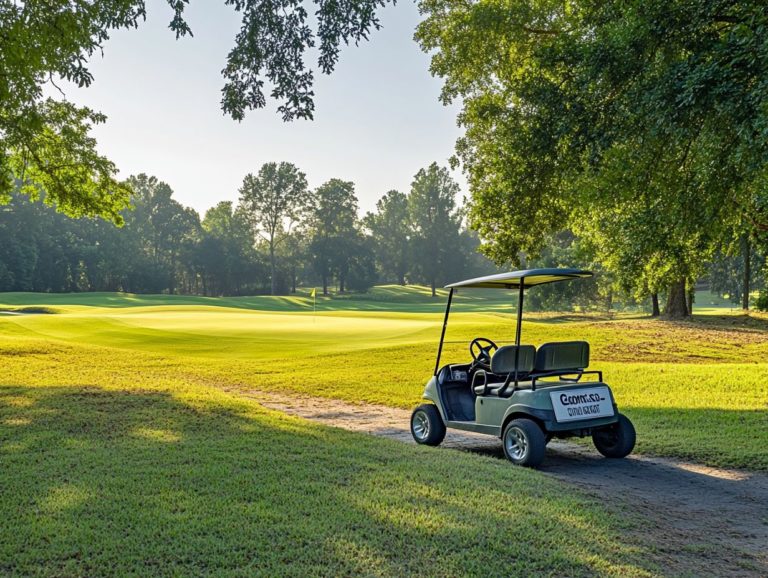What is Coverage for Agricultural Vehicles?
Agricultural vehicles are integral to your farming operations, yet they bring their own set of unique risks and challenges.
Recognizing the various types of agricultural vehicles and securing the appropriate coverage is vital for safeguarding your investment.
This article delves into the different insurance options available, such as liability and collision coverage, as well as the factors that can impact your premiums.
Discover how to select the right insurance provider so your agricultural vehicles are well-protected, allowing you to focus on achieving farming success.
Contents
- Key Takeaways:
- Understanding Agricultural Vehicles
- Importance of Coverage for Agricultural Vehicles
- Types of Coverage Available
- Factors that Affect Coverage
- How to Obtain Coverage for Agricultural Vehicles
- Frequently Asked Questions
- What is Coverage for Agricultural Vehicles?
- What types of vehicles are covered under agricultural vehicle coverage?
- What does coverage for agricultural vehicles protect against?
- Do I need coverage for agricultural vehicles if I already have insurance for my farm?
- Are there any specific requirements for obtaining coverage for agricultural vehicles?
- How can I determine the right amount of coverage for my agricultural vehicles?
Key Takeaways:
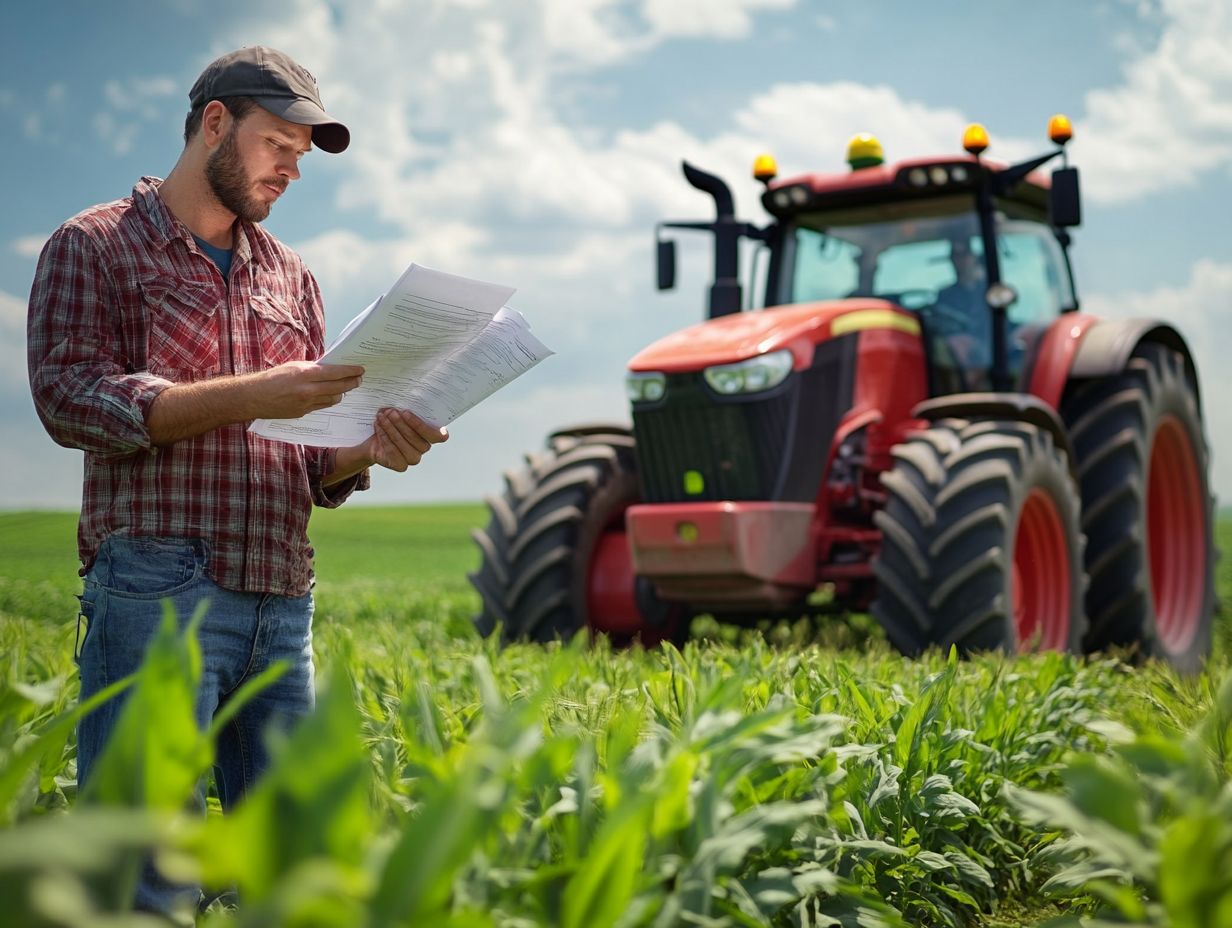
- Agricultural vehicles like tractors and harvesters are essential for your farm’s success.
- Get the right coverage to protect your investment and ensure peace of mind.
- Factors such as vehicle type, usage, location, and risk can affect coverage type and cost.
Understanding Agricultural Vehicles
Understanding agricultural vehicles is essential for you as a farmer. These machines tractors, harvesters, and sprayers form the backbone of modern farming operations. They are crafted to boost productivity and efficiency, navigating the complexities of agriculture that can be swayed by unpredictable market conditions and the whims of nature.
With a range of farm equipment at your disposal, including specialized machinery for irrigation systems, it s crucial for you to comprehend the specific functionalities and advantages of each vehicle. This knowledge empowers you to optimize your agricultural practices and safeguard your investments effectively.
Definition and Types
The term “agricultural vehicles” refers to a diverse range of machinery designed to make farming tasks easier. Tractors stand out as one of the most vital types of farm equipment in your arsenal. These vehicles can be categorized based on their specific functions, such as tractors, harvesters, and sprayers, each playing a pivotal role in enhancing the efficiency of your farming operations.
Take tractors, for example. They serve not just as a power source but also as the backbone for numerous attachments, like plows and cultivators, which significantly improve soil preparation. Harvesters maximize your crop yield by simplifying the cutting and gathering processes, drastically reducing labor time. Sprayers are designed for applying pesticides and fertilizers, ensuring that your crops receive precise treatments for healthier yields.
Grasping the unique contributions of each agricultural vehicle is essential for anyone in the farming game looking to optimize productivity and sustainability in an increasingly competitive agricultural landscape.
Importance of Coverage for Agricultural Vehicles
The significance of coverage for utility vehicles is paramount. Having the right insurance serves as a crucial financial safety net, protecting you against risks like natural disasters, theft, and equipment failure.
With crop prices fluctuating and market conditions often unpredictable, don’t wait! Secure a robust insurance policy now to protect your farm investment. This level of protection guarantees that your agricultural vehicles whether tractors or other machinery are shielded from unforeseen events that could result in substantial financial setbacks.
Protecting Your Investment
Protecting your agricultural vehicles is vital for your farm’s financial health. These machines represent a significant portion of your capital tied to agricultural commodities.
Adequate insurance coverage acts as a safety net against financial losses from theft, equipment breakdowns, and unforeseen incidents. This ensures longevity and stability in your farming endeavors.
To achieve optimal protection, explore various insurance options tailored to your specific needs. Comprehensive policies often cover damages from accidents, natural disasters, and liabilities related to your operations.
For example, consider coverage that includes:
- Collision protection, which safeguards against accidents involving other vehicles or objects.
- Liability coverage, which protects against injuries that may occur on your property.
With theft on the rise, policies like equipment theft protection can be invaluable. They offer peace of mind while safeguarding your investments. Adopting an overall strategy to risk management, including regular maintenance and up-to-date safety precautions, complements the security provided by insurance coverage. This enhances the resilience of your overall investment.
Types of Coverage Available
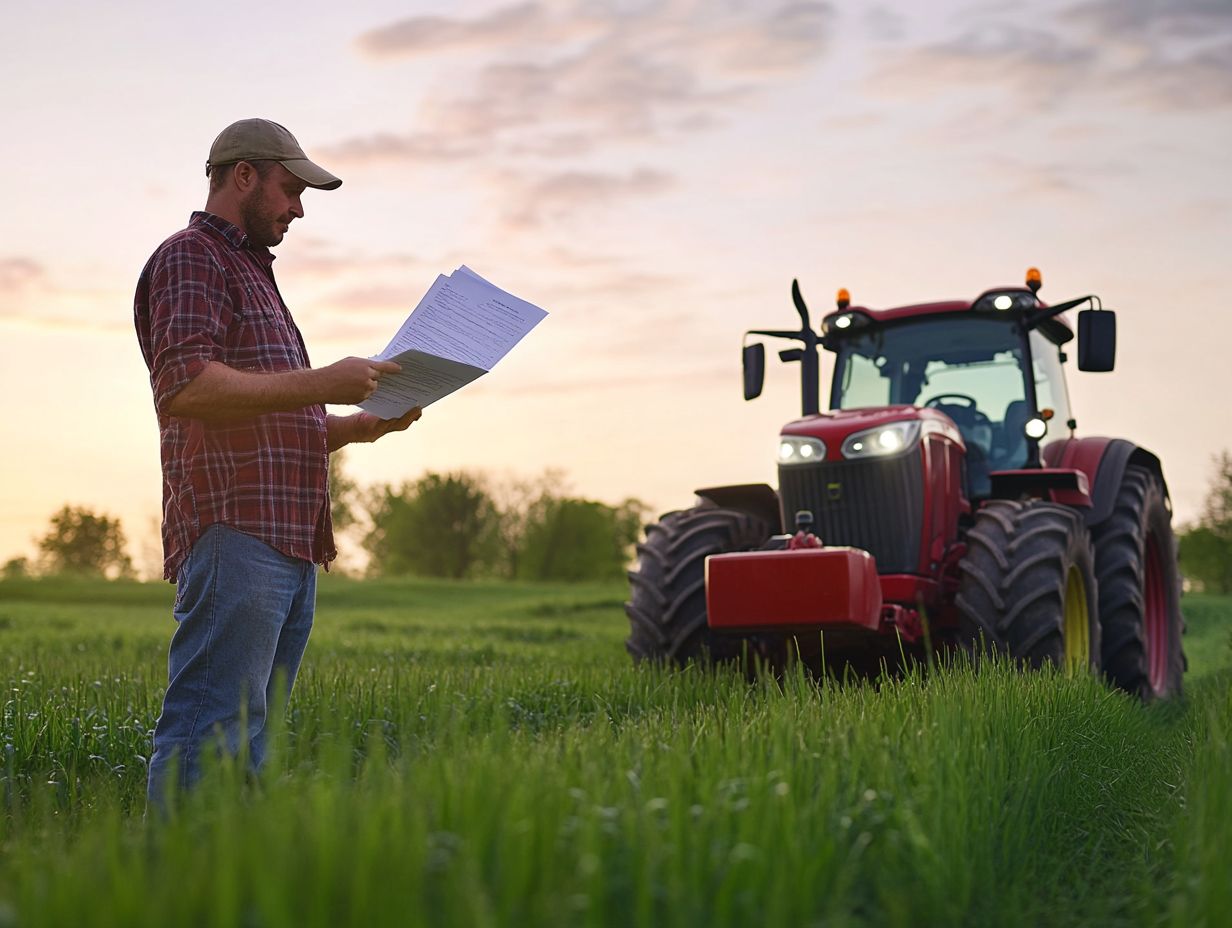
You have a variety of coverage options to protect your agricultural vehicles, each tailored to meet specific risks and needs. For instance, understanding coverage for antique tractors can help you choose the right liability insurance, which shields you against claims related to bodily injury and property damage.
Collision and comprehensive coverage can safeguard you from repair costs associated with accidents or unforeseen incidents. Options like theft protection and equipment breakdown insurance provide invaluable peace of mind, helping you mitigate financial losses.
Liability Insurance
Liability insurance is essential for protecting your assets. It shields you from potential claims related to bodily injury and property damage caused by your vehicles.
This coverage allows you to operate your machinery with confidence, knowing you’re financially protected in the event of an accident. Such protection becomes particularly crucial if your tractor accidentally collides with a neighboring property, causing damage to a fence or livestock.
The aftermath could lead to substantial repair bills and potential lawsuits. If your vehicle unintentionally injures a passerby while you’re hauling equipment, liability insurance would cover the medical expenses and legal fees associated with that claim.
By investing in liability insurance, you effectively safeguard your livelihood against the unpredictable nature of farming. This enables you to concentrate on cultivating your land instead of worrying about unforeseen legal challenges.
Collision and Comprehensive Coverage
Collision and comprehensive coverage are key to protecting your agricultural vehicles from various risks. For instance, coverage for commercial vehicles specifically addresses the repair costs that arise when your vehicle collides with another vehicle or object.
In contrast, comprehensive coverage protects you against non-collision-related incidents such as theft, vandalism, and equipment breakdown. For example, if your tractor collides with another vehicle while transporting goods, collision coverage will cover the repair expenses.
If that same tractor suffers damage from a storm or is stolen from a worksite, comprehensive coverage will help mitigate those losses. Together, these two types of coverage create a robust safety net, providing financial security that allows you to recover from accidents and maintain productivity despite unexpected setbacks.
This dual protection is crucial for effectively managing the inherent risks of agricultural operations.
Factors that Affect Coverage
Several factors influence the coverage options available for your agricultural vehicles. It is essential to grasp these considerations when selecting your insurance policies.
The type of vehicle you operate, its specific usage, and the location of your farming operations all play significant roles in determining both insurance costs and the types of coverage available. By understanding these risk factors such as environmental conditions and potential threats like vandalism or theft you can make informed decisions that ensure you receive adequate protection against financial losses.
Vehicle Type and Usage
The type of vehicle you own and how you intend to use it are crucial factors that influence the coverage for special interest vehicles available for agricultural vehicles.
Different machinery like tractors and sprayers comes with its own unique risks tied to its specific application. Insurers take these into account when determining premiums (the amount paid for insurance) and coverage limits (the maximum amount the insurer will pay).
For example, a tractor that spends its days in the field faces different risks of accidents and mechanical failures compared to a sprayer that applies fertilizers and pesticides. Insurers consider how many hours each vehicle operates, the environments in which they work, and the likelihood of accidents or equipment malfunctions.
These factors not only shape your baseline premiums but also affect optional coverages, such as liability, comprehensive, or collision protection. Make informed decisions today to protect your assets by securing coverage tailored to your unique agricultural operations.
Location and Risk Factors
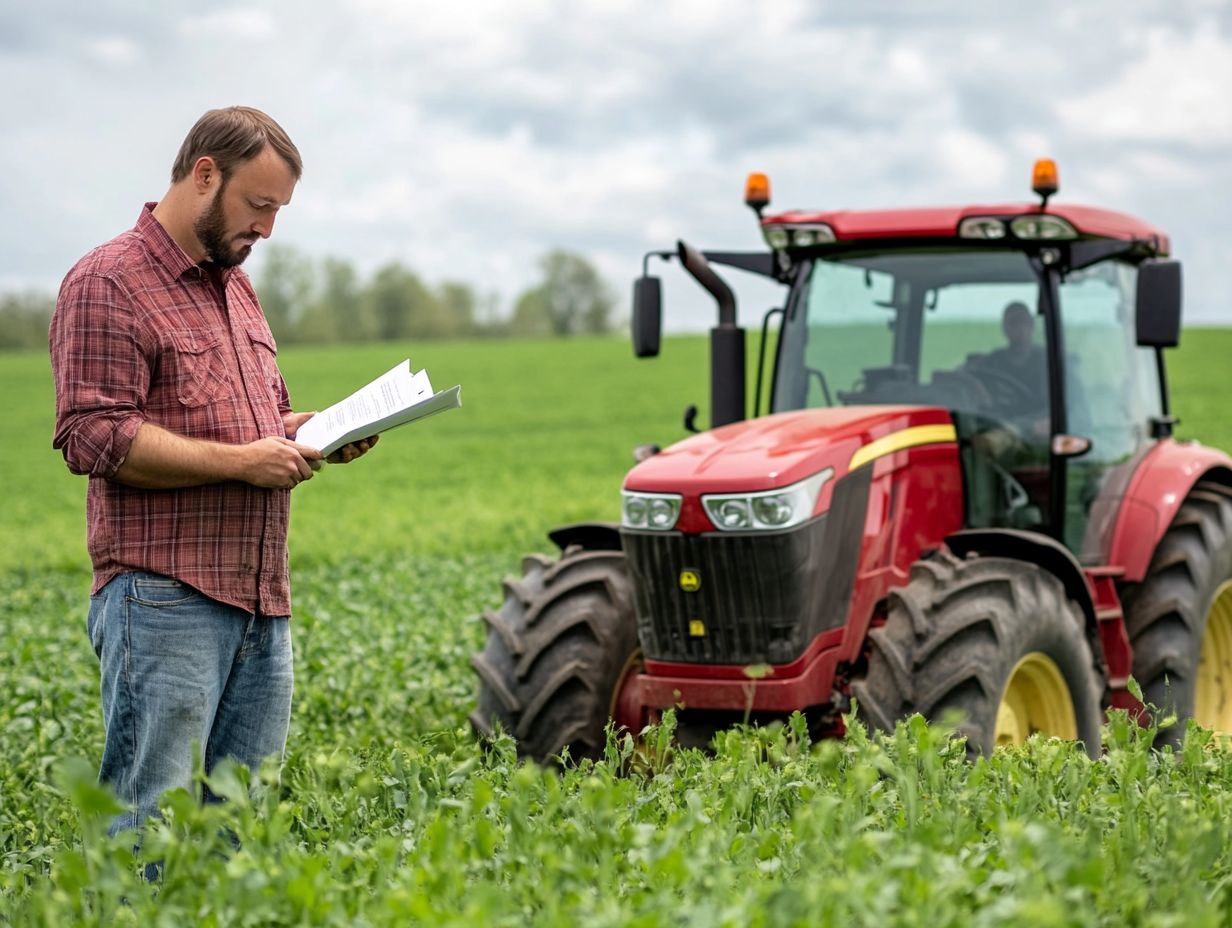
Location and associated risk factors significantly influence the insurance coverage for agricultural vehicles. Each region presents its own unique environmental conditions and threats, which can sway insurance costs, often resulting in higher premiums for areas prone to natural disasters or with elevated theft rates.
If you re farming in coastal regions, you may face the looming threat of hurricanes. This necessitates enhanced coverage for flooding and wind damage. Conversely, if your operations are in rural areas, you might contend with a greater risk of vehicle theft, leading insurers to impose specific theft deterrent requirements.
If you re in regions with harsh winters, you ll need coverage against snow-related damages. Understanding these geographical influences gives you the power to navigate your insurance options effectively. Ensure you secure adequate protection tailored to your unique circumstances.
How to Obtain Coverage for Agricultural Vehicles
Obtaining coverage for agricultural vehicles requires a thoughtful, systematic approach that starts with evaluating your equipment and understanding your specific insurance needs, including coverage for off-road vehicles.
Begin by researching potential insurance providers and consulting with an experienced insurance agent who specializes in farm insurance. This will give you valuable insights into the options available.
The process involves analyzing costs and policy inclusions to ensure that the coverage you choose aligns perfectly with the unique requirements of your farming operations. Consider essential factors like roadside assistance and equipment evaluation.
Don t wait secure your coverage now to safeguard your farming investments.
Choosing the Right Insurance Provider
Choosing the right insurance provider is vital for you as a farmer seeking effective coverage for your agricultural vehicles. The expertise of your provider can greatly influence the quality and variety of coverage options available to you.
When assessing potential insurance providers, it is crucial to consider their experience in the agricultural sector and their reputation within the farming community. A provider specializing in serving farmers is likely to offer tailored policy options that address the unique risks associated with agricultural operations.
An insurance agent will play a key role in this process, helping you evaluate the types of coverage that suit your farm’s individual needs such as comprehensive vehicle coverage, liability protection, or specific add-ons for specialty crops. This thorough evaluation aids in evaluating potential problems and ensures you have peace of mind, knowing you’re adequately protected against unforeseen events that could impact your livelihood.
Costs and Policy Inclusions
Insurance costs and policy inclusions are important factors when selecting coverage for your agricultural vehicles, as they directly influence the overall financial health of your farming operations.
The intricacies of insurance premium calculations depend on several factors, including the types of vehicles you use, the specific coverage options you choose, and the individual risk evaluations conducted by insurers. For example, larger or specialized machinery may lead to higher premiums due to their value and potential repair costs.
It s essential to understand what is included in your policy, such as liability coverage and loss-of-use provisions. Each farming operation has unique needs shaped by its scale, the crops grown, and the geographical risks encountered. By recognizing these nuances, you have the power to negotiate great terms that provide robust protection for your agricultural investments.
Frequently Asked Questions
What is Coverage for Agricultural Vehicles?
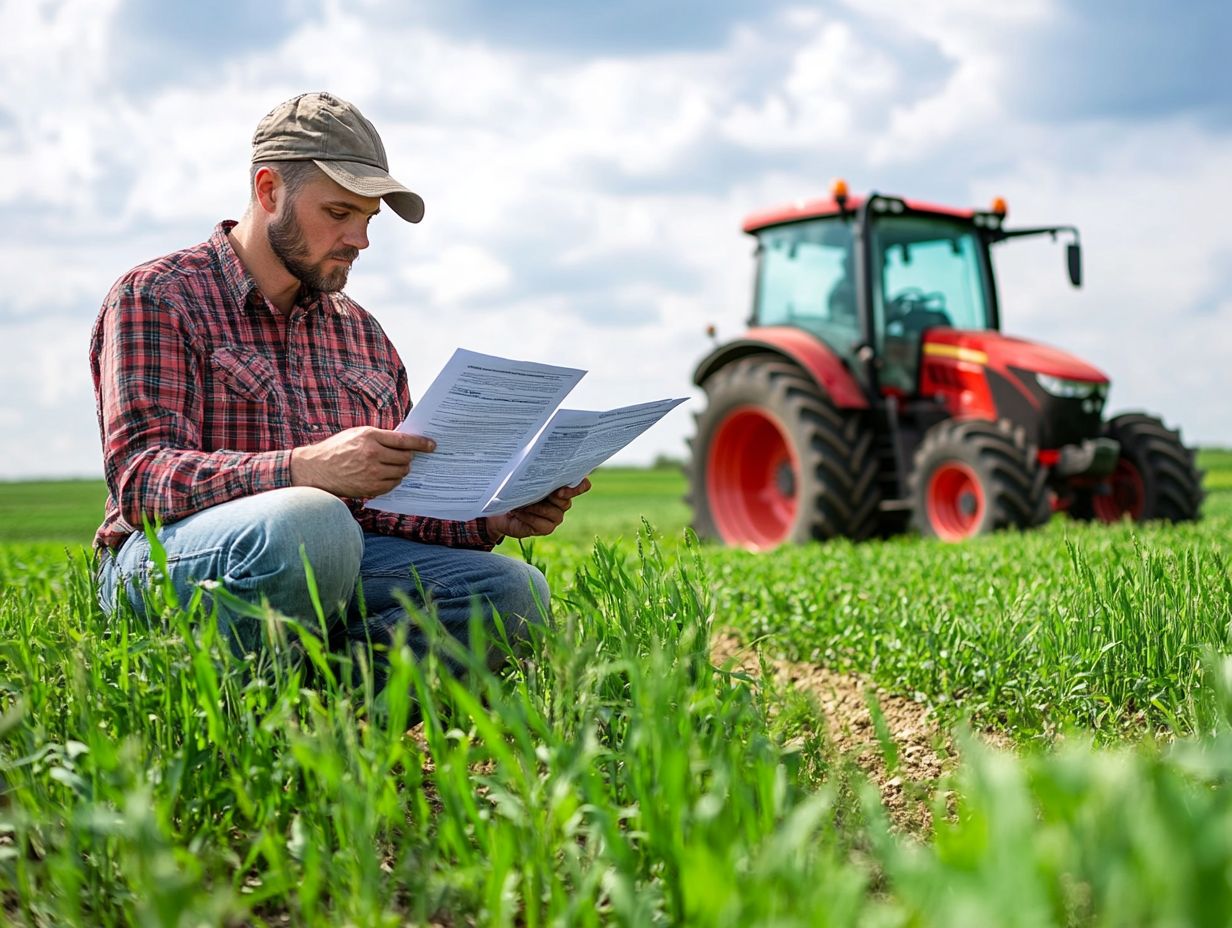
Coverage for agricultural vehicles refers to the insurance protection for farm vehicles used in farming or agricultural operations.
What types of vehicles are covered under agricultural vehicle coverage?
Agricultural vehicle coverage typically includes tractors, harvesters, trailers, and other specialized vehicles used in farming.
What does coverage for agricultural vehicles protect against?
This type of coverage protects against damages or losses that may occur to the covered vehicle, such as accidents, theft, or vandalism.
Do I need coverage for agricultural vehicles if I already have insurance for my farm?
Yes, while farm insurance may provide some coverage for agricultural vehicles, it is important to have specific coverage for heavy-duty vehicles to ensure adequate protection.
Are there any specific requirements for obtaining coverage for agricultural vehicles?
Yes, insurance companies may have specific requirements for obtaining coverage for agricultural vehicles, such as proof of ownership, vehicle registration, and maintenance records.
How can I determine the right amount of coverage for my agricultural vehicles?
The amount of coverage needed for agricultural vehicles depends on factors such as the value of the vehicles, their usage, and the level of risk involved. For more information, you may want to look into coverage for construction vehicles. It is best to consult with an insurance agent to determine the appropriate coverage for your specific needs.
Contact an insurance expert today to ensure your farming vehicles are properly protected!

